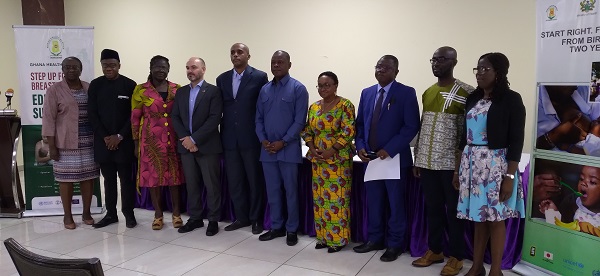
Panelists at a public forum on breastfeeding have advocated the need for family and institutional support to encourage new mothers to exclusively breastfeed their babies for six months.
They maintained that breastfeeding provided unmatched health benefits for babies and mothers and was the gold standard for holistic infant growth.
They are Child Health Specialist, Dr Isabella Sagoe-Moses, a Senior Lecturer at the Department of Child Health of the School of Medical Sciences, Kwame Nkrumah University of Science and Technology, Dr Gyikua Plange-Rhule, Mrs Esi Oforiwaa Amoaful, and Professor Richmond Aryeetey an Associate Professor at the University of Ghana School of Public Health.
Organised by the Family Health Division of the Ghana Health Service (GHS), the forum brought together participants within the health profession, development partners, civil society, academia, media, religious and family units.
The Nutrition Expert, Mrs Amoaful said breast milk acts as babies’ first vaccine, protecting them against many common childhood illnesses.
He said despite the World Health Organisation (WHO) recommendation for mothers to exclusively breastfeed babies for six months, which Ghana aligned with, a variety of issues prevented mothers from following the advice.
Key among them, she noted, was misinformation, myths and misconceptions around exclusive breastfeeding mostly influenced by cultural and social backgrounds.
Self-actualisation among women, she observed, also to a large extent discouraged exclusive breastfeeding coupled with factors like influx of foreign baby foods, lack of support and ignorance, among others.
“Often, we hear stories of mothers who start exclusive breastfeeding and stop along the way because their mothers, family relatives or friends advice claim the breast milk is not enough to satisfy the baby but that is false,” she said.
According to Mrs Amoaful, the breast naturally produces ideal milk to satisfy the baby at every stage of their growth and “as your baby needs more milk and nurses more, your breasts naturally respond by making more milk.”
She said, often new mothers were not informed on picking the cues to fully feed their babies and didn’t have needed support at home or the workplace to breastfeed which made them resort to alternative foods.
Mrs Amoaful encouraged men to particularly be keen on encouraging and supporting their wives to breastfeed.
The Director-General of the GHS, Dr Patrick Kuma-Aboagye said currently just about half of Ghanaian children were initiated to breastfeeding within one hour of birth and only 43 per cent of infants under six months of age are exclusively breastfed.
He admitted that more education, guidance and support with accurate information for new mothers would better prepare them for successful breastfeeding.
“New mothers need access to trained individuals with established relationships in the health care community who are flexible enough to meet mothers’ needs outside of traditional work hours and locations and provide consistent information.”
WHO Country Representative, Dr Francis Kasolo, said globally progress has been made with 50 per cent increase in the exclusive breastfeeding rates over the past 40 years.
However, he said, only 44 per cent of babies were exclusively breastfed globally leading to under-nutrition which accounts for 45 per cent of childhood deaths.
Dr. Kasolo said it was important that “we promote, protect and support breastfeeding.” adding that “we need to support mothers, caregivers and families to breastfeed through the health system and community to optimally breastfeed and sustain breastfeeding in the long term.”
BY ABIGAIL ANNOH







